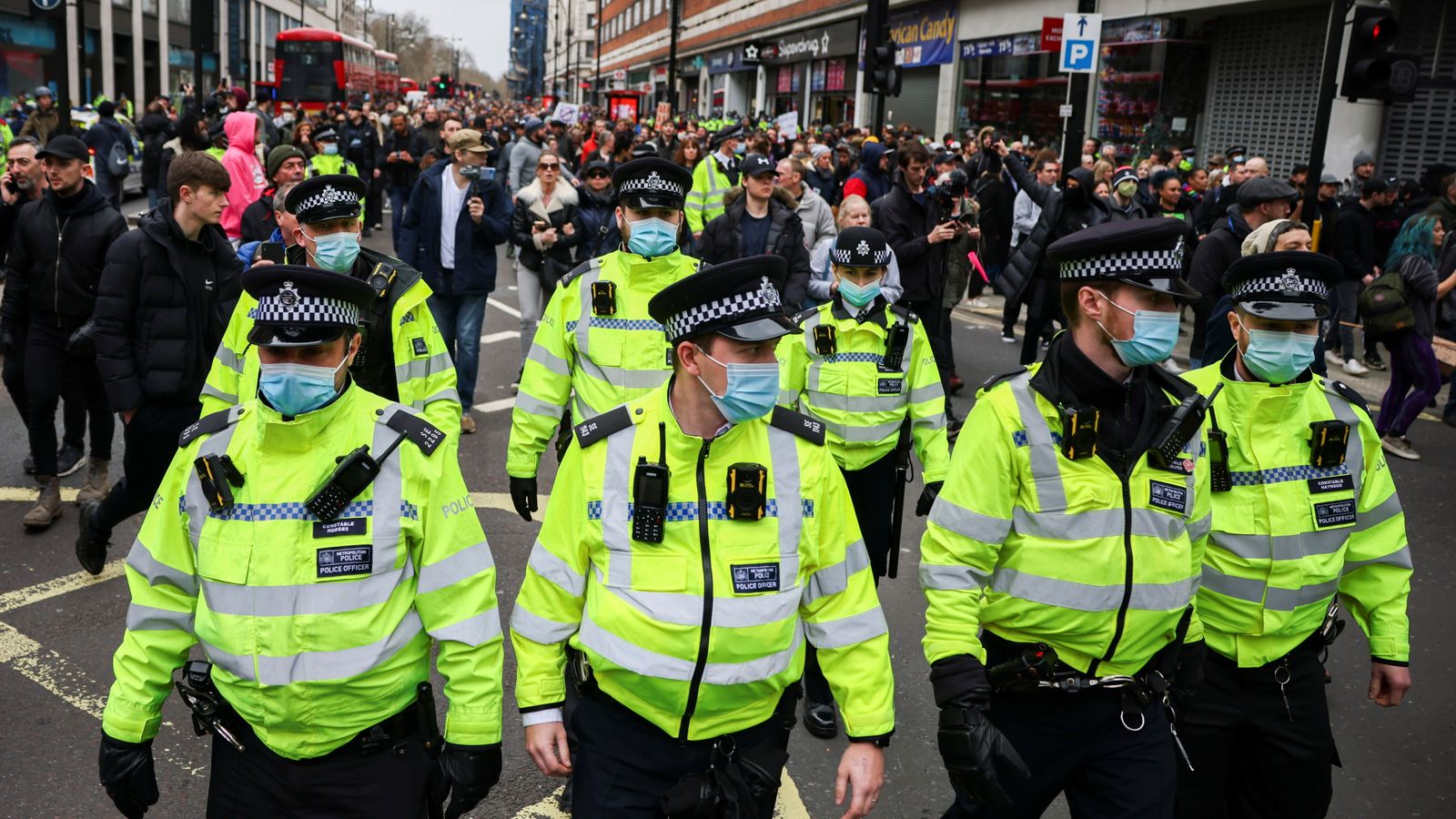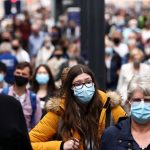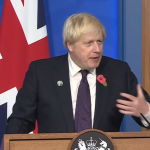Boris Johnson is facing a Tory revolt over a move to extend emergency coronavirus laws, with one leading lockdown critic vowing to oppose the “excessive and disproportionate” powers.
Conservative former minister Steve Baker told Sky News’ Sophy Ridge on Sunday programme he expected to vote “squarely against” the continuation of the “authoritarian” COVID-19 restrictions.
His criticism came as MPs are due to vote this week on keeping the coronavirus laws in place for another six months until October.
Latest live COVID updates from the UK and around the world
Thousands took part in an anti-lockdown protest in central London on Saturday, leading to a number of arrests.
But defending the government’s plans on Ridge, Defence Secretary Ben Wallace highlighted the progress made to “get on top” of the pandemic and argued now was not the time “to throw that away”.
He also signalled the curbs could be ended sooner, pointing out Parliament “can put in place powers and it can always remove powers”.
Meanwhile, a government scientific adviser has warned the lifting of restrictions now would see a wave of infections, leading to the deaths of vulnerable people still not fully protected by the vaccine.
Latest government data indicates more than half of the UK’s adult population – some 26,853,407 people aged 18 and over – have now received their first jab.
Please use Chrome browser for a more accessible video player
Raising his objections to the extension of the coronavirus laws, Mr Baker, who is deputy chairman of the self-styled COVID Recovery Group of Tory MPs, said: “I expect to vote against but the thing is, with so many vulnerable people now vaccinated and record progress being made, people are probably right to ask why the government is still seeking to hang on to these powers.”
He said it was difficult to predict the size of the likely backbench rebellion, but added: “Let’s be absolutely clear, because it seems Labour and the SNP will vote for any old authoritarianism these days it looks like the government will get their business with an enormous majority.
“But I do think it’s important that some of us do seek to hold the government to account with these extraordinary powers.”
Please use Chrome browser for a more accessible video player
He added: “I am expecting to vote squarely against, I think it’s excessive and disproportionate.”
But Mr Wallace said: “We are in a place at the moment where, unlike many other countries, we have started to get on top of it, slowed the flow to hospitals, started to reduce the tragic loss of life and started to roll out the vaccine at an unprecedented level.
“I don’t think now is the time to throw that away or potentially put that at risk; I think now is the time where the final mile is the most important thing for us all, to make sure that we knuckle down… and slowly but surely, all of us together, make sure that we tackle this dreadful pandemic.”
He added: “Parliament can put in place powers and it can always remove powers.
“I think what we want to indicate to the public at large is a plan that goes beyond a week by week, a sort of long-term plan and that involves putting certain tools in place.
“None of us want to have lots of draconian measures but this is an unprecedented global pandemic which has cost tens of thousands, hundreds of thousands of lives around the world and therefore putting those in place is really important.”
Labour’s shadow health secretary Jonathan Ashworth said caution was needed given there was still “a high level of virus circulating” and was “still quite dangerous out there”.
He told Ridge: “That will mean, I’m afraid, that governments will have to have the power to impose restrictions where necessary.”
However, he stressed the need for proper scrutiny and expressed frustration at MPs not being allowed to put down amendments.
Subscribe to Sophy Ridge on Sunday on Apple podcasts, Google podcasts, Spotify, Spreaker
Also speaking on Ridge, Professor Jeremy Brown, a member of the Joint Committee on Vaccination and Immunisation (JCVI), warned a “very large number” of at-risk people could develop a “serious” COVID-19 infection if restrictions are lifted now.
He said between 90% and 95% of people who are at high risk have been vaccinated, but mostly with one dose, which does not provide full protection.
He told Sky News: “Until we have done the second dose and everybody has been vaccinated, there is a little degree of infection which can still occur.
“So if you completely lift all restrictions there will be a wave of infections crossing the country and those that are not protected, either because the first vaccine hasn’t worked very well in them and they need their second dose, or because they have not had a vaccine at this point in time but are still vulnerable, they will get infections and they will probably end up in hospital and die.”






















